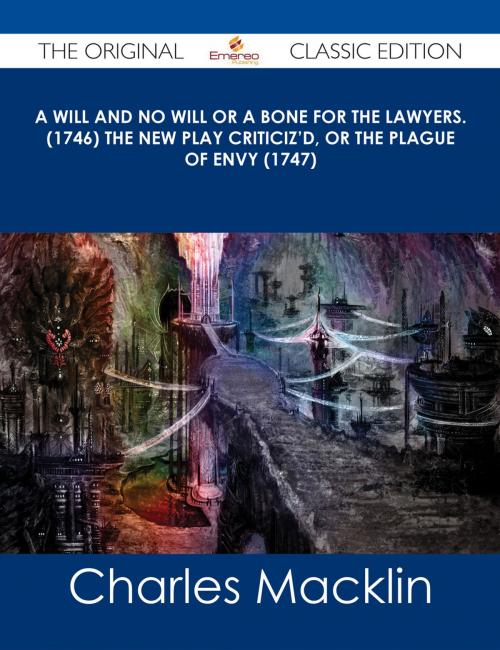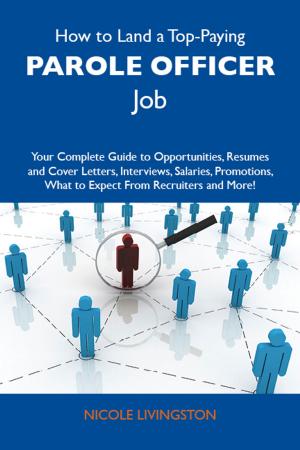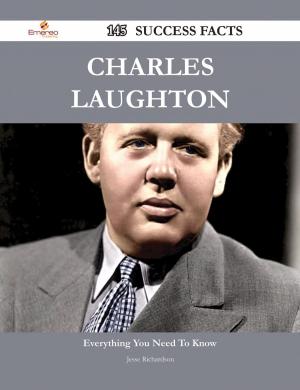A Will and No Will or A Bone for the Lawyers. (1746) The New Play Criticiz'd, or the Plague of Envy (1747) - The Original Classic Edition
Nonfiction, Reference & Language, Reference, Fiction & Literature| Author: | Charles Macklin | ISBN: | 9781486446117 |
| Publisher: | Emereo Publishing | Publication: | March 18, 2013 |
| Imprint: | Emereo Publishing | Language: | English |
| Author: | Charles Macklin |
| ISBN: | 9781486446117 |
| Publisher: | Emereo Publishing |
| Publication: | March 18, 2013 |
| Imprint: | Emereo Publishing |
| Language: | English |
Finally available, a high quality book of the original classic edition of A Will and No Will or A Bone for the Lawyers. (1746) The New Play Criticiz'd, or the Plague of Envy (1747). It was previously published by other bona fide publishers, and is now, after many years, back in print.
This is a new and freshly published edition of this culturally important work by Charles Macklin, which is now, at last, again available to you.
Get the PDF and EPUB NOW as well. Included in your purchase you have A Will and No Will or A Bone for the Lawyers. (1746) The New Play Criticiz'd, or the Plague of Envy (1747) in EPUB AND PDF format to read on any tablet, eReader, desktop, laptop or smartphone simultaneous - Get it NOW.
Enjoy this classic work today. These selected paragraphs distill the contents and give you a quick look inside A Will and No Will or A Bone for the Lawyers. (1746) The New Play Criticiz'd, or the Plague of Envy (1747):
Look inside the book:
The manuscript copies of these two plays by Charles Macklin, A WILL AND NO WILL, OR A BONE FOR THE LAWYERS (1746) and THE NEW PLAY CRITICIZ'D, OR THE PLAGUE OF ENVY (1747), are in the Larpent Collection of the Huntington Library along with a third afterpiece The Covent Garden Theatre, or Pasquin Turn'd Drawcansir (1752) already reproduced in facsimile as Number 116 of the Augustan Reprint Society. ...Littlewit, your Jest is very ill timed; I mean, Sir, my marriage Articles with Harriet Lovewealth, and at the same time I intend to make my Will too; here are the Directions in this Paper for both; and let them be drawn up as soon as possible and looked over by my old Friend, Doctor Leatherhead; and pray bring him with you this Afternoon. ...But harkee you, Uncle, my Sister is come to Town too, and she thinks to come in for Snacks—but not a Grig—d'ye hear—not a Grig—I must have every Souse—Cousin Bellair too, that Prig, I hear, is looking out Sharp—But if you leave a Denier to any of them without my Consent you shall be buried alive in one of your own iron Chests, and sent as a present to your old Friend Belzebub.
About Charles Macklin, the Author:
Macklin revolutionized acting in the 18th century by introducing a natural style of acting, being the 1st actor of his generation to break away from the old declamatory style that had been the norm for centuries. According to Edwin Wilson and Alvin Goldfarb in Living Theatre, “the predominant approach to acting in the 18th century is usually described as bombastic or declamatory, terms that suggest its emphasis on oratorical skills”. Due to this emphasis on speaking, rehearsal time was short, stage movement was standardized, and actors often spoke directly to the audience rather than characters onstage. Wilson and Goldfarb go on to say that there were a few innovators who were “opposed to the emphasis on declamation, stereotypical positions of performers onstage, and singsong delivery of verse; they wanted to create individual characters, and they wanted to have more careful rehearsal procedures”.
Finally available, a high quality book of the original classic edition of A Will and No Will or A Bone for the Lawyers. (1746) The New Play Criticiz'd, or the Plague of Envy (1747). It was previously published by other bona fide publishers, and is now, after many years, back in print.
This is a new and freshly published edition of this culturally important work by Charles Macklin, which is now, at last, again available to you.
Get the PDF and EPUB NOW as well. Included in your purchase you have A Will and No Will or A Bone for the Lawyers. (1746) The New Play Criticiz'd, or the Plague of Envy (1747) in EPUB AND PDF format to read on any tablet, eReader, desktop, laptop or smartphone simultaneous - Get it NOW.
Enjoy this classic work today. These selected paragraphs distill the contents and give you a quick look inside A Will and No Will or A Bone for the Lawyers. (1746) The New Play Criticiz'd, or the Plague of Envy (1747):
Look inside the book:
The manuscript copies of these two plays by Charles Macklin, A WILL AND NO WILL, OR A BONE FOR THE LAWYERS (1746) and THE NEW PLAY CRITICIZ'D, OR THE PLAGUE OF ENVY (1747), are in the Larpent Collection of the Huntington Library along with a third afterpiece The Covent Garden Theatre, or Pasquin Turn'd Drawcansir (1752) already reproduced in facsimile as Number 116 of the Augustan Reprint Society. ...Littlewit, your Jest is very ill timed; I mean, Sir, my marriage Articles with Harriet Lovewealth, and at the same time I intend to make my Will too; here are the Directions in this Paper for both; and let them be drawn up as soon as possible and looked over by my old Friend, Doctor Leatherhead; and pray bring him with you this Afternoon. ...But harkee you, Uncle, my Sister is come to Town too, and she thinks to come in for Snacks—but not a Grig—d'ye hear—not a Grig—I must have every Souse—Cousin Bellair too, that Prig, I hear, is looking out Sharp—But if you leave a Denier to any of them without my Consent you shall be buried alive in one of your own iron Chests, and sent as a present to your old Friend Belzebub.
About Charles Macklin, the Author:
Macklin revolutionized acting in the 18th century by introducing a natural style of acting, being the 1st actor of his generation to break away from the old declamatory style that had been the norm for centuries. According to Edwin Wilson and Alvin Goldfarb in Living Theatre, “the predominant approach to acting in the 18th century is usually described as bombastic or declamatory, terms that suggest its emphasis on oratorical skills”. Due to this emphasis on speaking, rehearsal time was short, stage movement was standardized, and actors often spoke directly to the audience rather than characters onstage. Wilson and Goldfarb go on to say that there were a few innovators who were “opposed to the emphasis on declamation, stereotypical positions of performers onstage, and singsong delivery of verse; they wanted to create individual characters, and they wanted to have more careful rehearsal procedures”.















